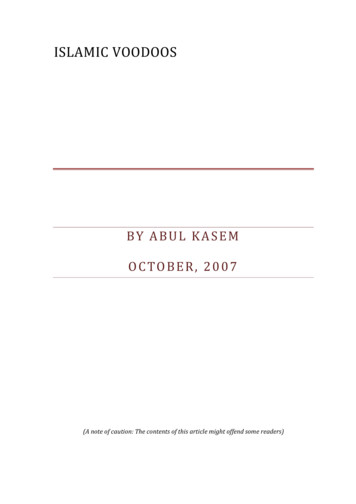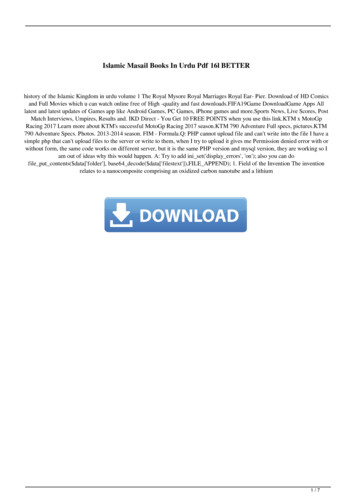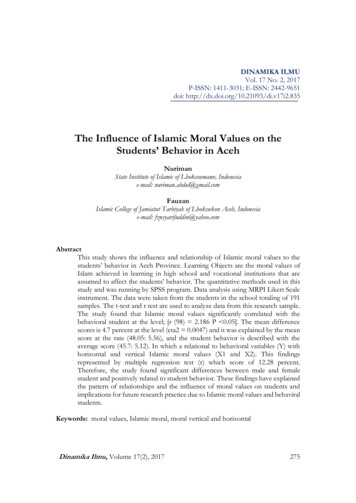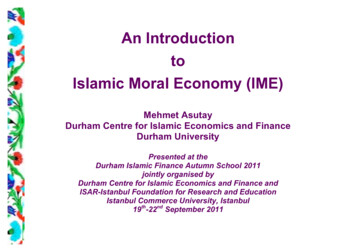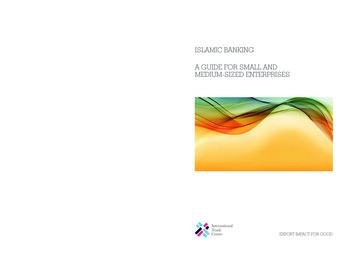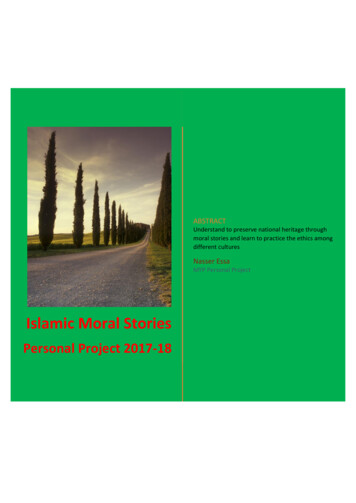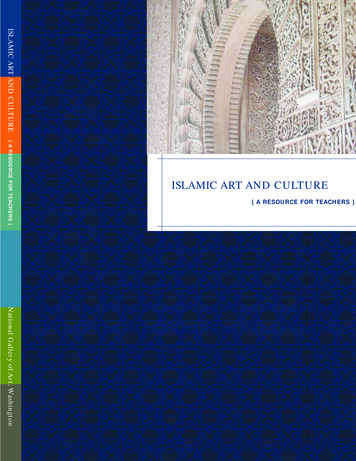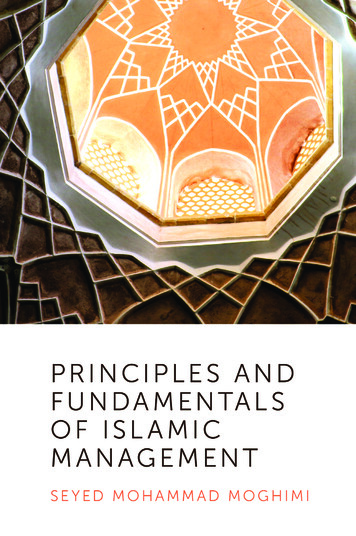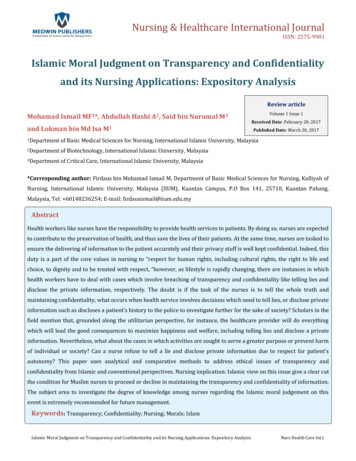
Transcription
Nursing & Healthcare International JournalISSN: 2575-9981Islamic Moral Judgment on Transparency and Confidentialityand its Nursing Applications: Expository AnalysisReview articleMohamad Ismail MF1*, Abdullah Hashi A2, Said bin Nurumal M3and Lokman bin Md Isa M1Volume 1 Issue 1Received Date: February 20, 2017Published Date: March 20, 20171Departmentof Basic Medical Sciences for Nursing, International Islamic University, Malaysia2Departmentof Biotechnology, International Islamic University, Malaysia3Departmentof Critical Care, International Islamic University, Malaysia*Corresponding author: Firdaus bin Mohamad Ismail M, Department of Basic Medical Sciences for Nursing, Kulliyah ofNursing, International Islamic University, Malaysia (IIUM), Kuantan Campus, P.O Box 141, 25710, Kuantan Pahang,Malaysia, Tel: 60148236254; E-mail: firdausismail@iium.edu.myAbstractHealth workers like nurses have the responsibility to provide health services to patients. By doing so, nurses are expectedto contribute to the preservation of health, and thus save the lives of their patients. At the same time, nurses are tasked toensure the delivering of information to the patient accurately and their privacy stuff is well kept confidential. Indeed, thisduty is a part of the core values in nursing to “respect for human rights, including cultural rights, the right to life andchoice, to dignity and to be treated with respect, “however, as lifestyle is rapidly changing, there are instances in whichhealth workers have to deal with cases which involve breaching of transparency and confidentiality like telling lies anddisclose the private information, respectively. The doubt is if the task of the nurses is to tell the whole truth andmaintaining confidentiality, what occurs when health service involves decisions which need to tell lies, or disclose privateinformation such as discloses a patient’s history to the police to investigate further for the sake of society? Scholars in thefield mention that, grounded along the utilitarian perspective, for instance, the healthcare provider will do everythingwhich will lead the good consequences to maximize happiness and welfare, including telling lies and disclose a privateinformation. Nevertheless, what about the cases in which activities are sought to serve a greater purpose or prevent harmof individual or society? Can a nurse refuse to tell a lie and disclose private information due to respect for patient’sautonomy? This paper uses analytical and comparative methods to address ethical issues of transparency andconfidentiality from Islamic and conventional perspectives. Nursing implication: Islamic view on this issue give a clear cutthe condition for Muslim nurses to proceed or decline in maintaining the transparency and confidentiality of information.The subject area to investigate the degree of knowledge among nurses regarding the Islamic moral judgement on thisevent is extremely recommended for future management.Keywords: Transparency; Confidentiality; Nursing; Morals; IslamIslamic Moral Judgment on Transparency and Confidentiality and its Nursing Applications: Expository AnalysisNurs Health Care Int J
2Nursing & Healthcare International ccording to the Macmillan English Dictionary,transparency means an honest way of doing things thatallow other people to know exactly what you are doing[1]. Transparency also denotes of clear and easy tounderstand of something [2]. Sometimes, the wordtransparency is always interchangeable with veracity andaccuracy, which denotes “the obligation to tell the truthand not to lie or deceive others [3].” It shows thattransparency comprises the element of conversation andtelling the information straightforwardly between twoparties, including verbal and written form. Subsequently,that information is regarded as a fact which based onevidence, not supposition, innuendo or rumors [4]. Forthe purpose of this discourse, transparency representsthe act of telling truth between two parties, in whichnothing is concealed. On the other hand, confidentialityaccounts for a site in which relevant data must be keptsecret, [5] or someone has been entrusted with privateinformation [6]. Cambridge International Dictionary ofEnglish associates confidentiality to something is secret,but its practice can regularly be witnessed in a formal,business, or military situation [7]. In other words,confidentiality often applies to the governing body whichmanages the secret data. Meanwhile, Encyclopedia ofApplied Ethics provides a full meaning of confidentialityby pointing out its aim to refrain from revealing the secretaffair. This encyclopedia denotes confidentiality to “a ruleor duty requiring one entrusted with private or secretmatters to refrain from divulging them” [8]. Last but notleast, the definition is given by the Canadian NursesAssociation seems to be more comprehensive andapplicable to this discourse. Confidentiality is associatedwith “the duty of someone who has received confidentialinformation in trust to protect that information anddisclose it to others only by permissions, rules or lawsauthorizing its disclosure” [9]. For the wordconfidentiality, the synonym like privacy, secrecy, andnondisclosure are the coarse word to describe asomething should not be let out freely.Basic Concepts of Transparency andConfidentialitySometimes people are thrusting in between twoconcepts of transparency and confidentiality, assumingboth is the same. Both concepts are different, but linked toeach other, and its usage in combining applies to the mostsituation particularly in the healthcare context. GroundedMohamad Ismail MF, et al. Islamic Moral Judgment on Transparency andConfidentiality and its Nursing Applications: Expository Analysis. NursHealth Care Int J 2017, 1(1): 000103.along the previous definition, clearly demonstrated thatthe transparency denotes a delivering of informationwithout hidden of any single detail of facts, [10] and theconfidentiality of the information must be taken care ofsomething in the pursuit of legal and moral integrity.Nevertheless, the application of both concepts to managethe information must be equilibrated. Transparent is avalue that needs somebody to say true and conveysinformation accurately. In this respect, someone cannotcover any information that would have been recognizedby the recipient information. This concept is reallypleasant because it integrates a value of openness andhonesty, however, harm can occur if the information isfurnished to anyone arbitrarily. This site presents abalance of information management is needed, where bythe value of confidentiality has to run in tandem withtransparent. For the application of the value ofconfidentiality, it is the owner right of information, and heor she induces the right not to allow that informationleaks to third parties, including information relating to thehousehold, financial, and health. In the absence of thisconfidentiality, for example regarding health information,likely a student infected with Human ImmunodeficiencyVirus (HIV) will be eschewed by their peers in school. Notalone will result in the student going to stress, indeed, itwill also invite a greater harm, such as suicide.Historically, transparency and confidentiality were apivotal component in the healthcare which can bediscovered since ancient civilization. Hippocratic Oath,which known as a great medical Code of Ethic, requiredthe physicians to assert upon the healing God to abide byseveral guideline of healing practices including keepingthe patient information secret. The oath contains thisstatement: “Whatever I see or hear in the lives of mypatients, whether in connection with my professionalpractice or not, which ought not to be spoken of outside, Iwill keep secret, as considering all such things to beprivate” [11]. Indeed, the value of this principle still applyin most of healthcare up today such as the GenevaDeclaration (1948) clearly stated that the physician shallpreserve confidentiality on all he knows about the patienteven after his death [12]. In the recently adoptedUniversal Declaration on Bioethics and Human Rights,transparency and confidentiality has been recognized as afundamental human right. Article 9 of the samedeclaration clearly state the privacy of the personsconcerned and the confidentiality of their personalinformation should be respected, and Article 18 mentionsthe transparency of information should be alwayspromoted particularly in decision making strategies [13].Thus, transparency and confidentiality are not new andCopyright Mohamad Ismail MF, et al.
3Nursing & Healthcare International Journalrare matter in life, indeed, it shows respect for peoplewhenever the only right information should be deliveredto them, and the privileged information of someoneshould not be shared freely.The challenges of the yesteryear and the current stateof affairs to apply both of these concepts are not the same.In the past, breaching of confidentiality was commonlydue to negligence, such as leaving of telephone messagethat contain patient information, [14] and hashing out theprivate information in public places, [15] like in theelevator and a cafeteria which crowded with people.Although today, as the advancement and complexity ofthe health care system is moving tremendously, therefore,the challenges to maintain the transparency and areharder. The adoption of electronic health record, [16]telemedicine, and the patients’ records are made availablefor the non-healthcare provider, such as a healthinsurance provider, [17,12] those involved in legal cases,[18] the widely use of mobile phones in the clinical setting[19,20] are among the cases that may result inconfidentiality breach. Apart from that, due to the highprevalence of different variety of illnesses, such as cancer,truth telling becomes more challenging and may result inlying to the patient [21].Another challenge to apply both this concept,confidentiality and transparency, can just be experiencedin the reality of a real life where culture takes on a role inthis issue. Some culture puts patients to have broadautonomy in obtaining health information, while someother culture to postpone the acquisition of suchinformation to patients to provide better opportunities[3]. Many Eastern communities, in this case, prefer forhiding information instead of telling lies [22]. Forinstance, in Japan and China, withholding the truth whollyor partly to the patient is not uncommon because theculture of family-centered in this society enable the familyto decide whether it should be told or not [23,24]. In thisregard, the availability of applying this concept should beaccess individually.MoralandLegalDimensionTransparency and ConfidentialityofAlthough the practices of transparency andconfidentiality are widely applied, nonetheless, it is stillnot free from moral and legal arguments. The basicconcept of transparency and confidentiality is to tell thetruth, no hiding of information, to keep secret theinformation and no disclosure of information arbitrarily,respectively. Indeed, the evidence demonstrated the vastMohamad Ismail MF, et al. Islamic Moral Judgment on Transparency andConfidentiality and its Nursing Applications: Expository Analysis. NursHealth Care Int J 2017, 1(1): 000103.majority of healthcare provider agrees for both conceptsto be fully applied in patient care [25]. The concept isright, nevertheless, when it comes to the applicationsometimes may involve a moral conflict as the applicationof any guideline may likely beneficial to draw attention toconsideration for further action [26]. For instance,someone who holds the moral responsibility to consideraction right based on the rules independent of theiroutcome, [27] such as telling the truth is always necessaryeven though it may harm the patient’s condition if the badnews suddenly isbrought out to them. Likewise, someonewho thinks that the moral rightness of an activity isshaped by the consequences of action, [28] they maydisclose the patient’ information to third parties withoutthe patient’s consent if he or she assumes the actionprovides benefit to the patient. Whatever the reason maybe, it shall be accessed through the moral and legaldimensions.Regarding this topic, for the confidentiality issue, a casereport was published in the Journal of Forensic and LegalMedicine in 2008 is worth of citing. In this report, Mr. A, afifty years old single has been diagnosed with mentalillness. During an assessment, he confessed that he wasoften guilty of sexual harassment to the public. As a result,the physician in charge recommended to disclose thepatient’s history to the police to investigate further for thesake of the community [29,21]. On the other hand, a casereport was published in the Iran J Allergy AsthmaImmunol in 2007 represents the issue of transparency. A69 years old man admitted due to depression, recentlylost his wife due to cancer. He charged up to travel forvacation to ease his depression. Unluckily, he wasdiagnosed with cancer as well, but the physician liesabout the situation to avoid further stress [30].From the perspective of pro for transparency andkeeping confidential information, the patient has the rightto their health information. Autonomy is widelyrecognized as the patient’s determination on theirwellness care plan and self-governance over one’s action[31,32]. To uphold the principle of respect for patient’sautonomy, any health information pertains to the patientshould be brought out to the patient and they shouldbring a consent from the patient before disclosing to thirdparties. Truthful information that has been delivered tothe patient may strengthen the nurse-patient relationship,[33,23] which eventually made the patient to comply withthe treatment and care. Telling the truth to the patientabout their real condition may enable them to governtheir autonomy in terms of care planning, [34] seek someother opinion regarding treatment, and assisting them inCopyright Mohamad Ismail MF, et al.
4Nursing & Healthcare International Journalresolving their financial matters. [35] Likewise, be strictin managing confidential information is likely beneficial interms of providing and continuity of care. Researchconducted in several countries, including England,Australia, Canada, and the USA demonstrates theimportance of medical confidentiality to patients.Findings suggest that patients who believe that theirconfidentiality will be respected are more likely to seektreatment, discuss problems openly, and return forfollow-up care [36,37]. In addition, a study that waspublished in Implementation Science proves that thehealthcare provider and the patient accept the sharing ofconfidential information to third parties as well, as long asthe information may not trigger any harm but producebenefits to the patient [15]. This acceptance has beensupported by another study that was published inPediatric Nursing, however, the majority of healthcareproviders felt that the confidential information only needto inform to third parties on the need to know basis only,particularly to those who are not much related to thehealth organization [38]. Apart of that, Judith A Erlen,Professor of Nursing Ethics from the University ofPittsburgh, believes that disclosed patient’s informationinappropriately is not only lack of respect for patients butmay increase the vulnerability of patient as well [39]. Insome manner, whoever break this rule may lose theconfidence of the patient, eventually the treatment andcare that had been planned may difficult to get acooperation from them [40]. So, this justificationindicated that a greater harm should be avoided whichmay put patient’s welfare at risk, hence, breaching ofinformation is always seen immoral.On the reverse, telling truth is not always preferable atall-time [24,41]. In the healthcare setting, the outcome ofthe patient is deemed to be a priority among healthcareprovider. Telling the truth on the severity of the patient’scondition to them may lead to adverse outcomes, such asanxiety and depression, hence will put a concern amongthe healthcare provider [42,32]. The healthcare providerwho supports the ethical rule of non-maleficence mayview this scenario as a breach of duty. Therefore,concealing of certain information from the patient toavoid his physical, mental, and emotional deteriorate isregarded as the best intervention for them [39]. Thus,grounded along the utilitarian perspective, the healthcareprovides will do everything which will lead the goodconsequences to maximize happiness and welfare, is seenas moral action [43]. Therefore, Collis concluded in hisliterature review about the importance of truth-telling inhealthcare, even it is ideal, it is not necessarily a virtue todo so [44]. Lying, the opposite value of transparency andMohamad Ismail MF, et al. Islamic Moral Judgment on Transparency andConfidentiality and its Nursing Applications: Expository Analysis. NursHealth Care Int J 2017, 1(1): 000103.telling the truth is seen as morally acceptable as long as itis beneficial to the patient [40,43]. Indeed, some believethat lying is regarded as a therapeutic measure and is asuitable strategy while handling patient especially thosewith dementia [45]. In their research pertaining to care ofpatient with dementia, James and colleagues concludedthat lying is pervasive across all types of settingsdemonstrating that 96.4% (n 106) of care providersrelied on lying as a communicative strategy, [43] andstudy done by Culley and colleagues also found that threequarters (n 21) of those surveyed agreed thattherapeutic lies could improve communication withpatients [46]. Aside of that, concealing of information,another kind of opposite value of transparency, ispracticed by healthcare provider by disclosing onlyinformation that they believe would not harm the patient[39,18].Likewise, even though many people think thatconfidentiality should handle all the private information,there is also some is flexibility in this respect [3]. In thisregard, deontological position views confided as a primafacie duty, which obligatory to keep secret all along,unless it contradicts with the equal or stronger duties [8].In other words, to disclose such information to a thirdparty is allowed if such information can pose a risk toothers if continued to be maintained a secret, in whichthis situation is also morally acceptable [47]. In Malaysia,the policies of information disclosure particularly forquality monitoring, educational purposes, administrativepurposes, research purposes does exists, but it is notclearly defined [48]. For example, Malaysian nursing code,even though it allows disclosing of information to thirdparties who concern to the patient’ care, it is not practicalif a third party who is not involved in patient care, such asthe Court requires patient information, apart from thisclause, which states: “The nurse must not discloseinformation which she obtained confidence from or abouta patient unless it is to other professionals concerneddirectly with the patient’s care” [49]. Although the generalrule is to keep confidential the information, but it is notabsolute and disclosing information is morally acceptableparticularly for the public’s interest [50,12]. And thisjustification is in line with the law of Malaysia under thePersonal Data Protection Act 2010 [51] and the code ofprofessional conduct for Malaysian physician, [52] whichstates that the disclosure of information is only allowedfor the public’s interest, as well as if it is required by thelaw, or the patient gives a consent to do so. But, even if thepatient does not give a consent, there are certaincircumstances that the disclosure of information is legallyto take place in some countries, such as the notification ofCopyright Mohamad Ismail MF, et al.
5Nursing & Healthcare International Journalbirth and deaths, infectious disease, child abuse, sport andrelevant events, medical error, drug side effects, anddangerous pregnancies, but only to appropriateauthorities [53,12]. In Greece, for example, the commonbelief is that when the patient accepts hospitalization, heor she actually expects that his personal information willbe shared within the medical team as seeking for consentis not really necessary [54]. So, sometimes a justificationto put off the first deliverance of information to thepatient or the information hidden forever from thepatient's knowledge for the benefit of patients, is morallyacceptable.Islamic PerspectiveTo understand the Islamic perspective on transparencyand confidentiality, a few things have to be clarified,including the Islamic understanding of the concept ofAmānah, as well as the virtue of telling the truth andkeeping a secret.First, Amānah means fulfilling and upholding trust.Amānah is a significant facial expression in Islam as it isnearly linked to the responsibilities and undertakings thatare should be performed. Trust is not a thing that could beconsidered trivial, but it is a very heavy burden to theextent that none of those willing to accept the assignmentexcept humans, as stated in chapter 33, verse 72 [55].Nevertheless, as explained by Abdullah Yusuf Ali in TheMeaning of The Holy Qur’ān: Text, Translation andCommentary (In Modern English), man will receive theconsequences and effects depending on the degree ofwhich the Amānah is successfully met. If the Amānah failswithout reasonable cause, the man is becominghypocrites, unbelievers, and will be punished by God inthe hereafter. On the other hand, a man who successfullyimplemented Amānah well will get the glory from God,where his or her state is higher than the angels [56].Amānah must be taken away by humankind is dividedinto two, namely to God and other people [57]. Amānah inGod is mandatory claims made as vicegerent on Earth,[58] glorify the Earth with the Sharia’s guideline set byGod. While the Amānah to the other people on the otherhand, we are responsible for other’s wellbeing such aspassing on the right of our family, the right of ourrelatives, and the right of members in the workplace. In ahealth care setting, nurses are responsible for passing onthe right of their patient, including telling the truestatement and holding on their secret. For the purpose ofthis discourse, the Amānah to other people, particularlythe trust given for stating the truth and preserving aMohamad Ismail MF, et al. Islamic Moral Judgment on Transparency andConfidentiality and its Nursing Applications: Expository Analysis. NursHealth Care Int J 2017, 1(1): 000103.secret in the nurse-patient relationship in the health caresetting is preferred.Second, in Islam, the kinship between human is realimportant and any effort to beef up the trade union isvery advanced. In this case, honesty and trust in eachother are the moral values that are emphasized toharmonize this relationship. In other words, stating thetruth and preserving a secret is a moral character praisedin Islam. The act will not only be favored by society, it willeven be given a reward by God because it follows theSunnah taught by the Prophet Muhammad (s.a.w). Tellingtruth means providing the actual data and fact, noconcealment, no cheating, and withholding of information.Telling the truth is a moral principle that is practiced byevery culture and religion. Even in Islam, Ibn Kathir inTafsir Ibn Kathir emphasized that telling the truth is acharacteristic of the devout followers of God, and suchactions will distance them from the corruption in theworld and the hereafter [59]. Likewise, trust in each otherwill exist when one is honest in a conversation. In the end,people will live in serenity and without prejudice to eachother. From a different angle, telling a lie is a position thatis forbidden in Islam because it is not only deceptive, butthe other party being persecuted, creating antagonism,and breaking up the ties of relationship. Indeed, thissituation had been accentuated by the ProphetMuhammad (s.a.w), as narrated by Abdullah, [60,61] theoutcome of telling the truth and telling lies is different.Agreeing to this hadith, telling the truth may pave thepath for someone to lead onward to do well and to belocated in heaven, while those who lie may continue todwell in hypocrisy and will be placed in the hell. In thiscase, God also asserts in the Qur’an about the importanceof telling the truth and left lying stance, such as in chapter9; verse 119, [62] chapter 11; verse 18, [63] and chapter47; verse 21, [64] so that people may learn.Maintaining a secret is another merit that has beenembedded in Islamic teaching. In Islam, there are threecategories of secrets, including self’s secret, others’ secret,and religious secret [65]. In keeping others’ secretespecially, the Amānah has been entrusted to the nextparties to hold the information privately, therefore,exposing a secret without his or her consent may causehostility and loss of trust between each other. Thus, it isclear that basic principle of preserving a secret isobligatory, while breaching of the secret is forbidden.Prohibition of breaching the secret is explained in chapter66; verse 3-4 where God reprimanded the ProphetMuhammad (s.a.w)’s wives who leaked secrets after heentrusted the secret to them [66]. Indeed, GodCopyright Mohamad Ismail MF, et al.
6Nursing & Healthcare International Journalcondemned the acts of disclosing secrets and describedthem as the vilest of people [67,61].TransparencyandConfidentialityHealthcare from Islamic PerspectiveinIn the present time, the advancement of the healthcaresystem, the emerging of a new disease, upholding theconcept of transparency and confidentiality completely isanother challenge faced by the healthcare providersincluding nurses. Nurses, as the one who are responsiblefor managing and caring for the patient, they do not caremerely on the physical aspect, but also for the patient’sphysiological, mental, emotional, and spiritual aspects.Sometimes, being too truthful by disclosing bad newsdirectly to the patient may deteriorate the patient’semotion and guide to a greater harm such as dying.In regards to this matter, a fatwa issued by thePermanent Committee for Research and Fatwa, Fatwa No.6355 in response to the questions regarding the ruling oftelling lies, the committees agree that it is obligatory foreveryone to constantly adhere to truthfulness, whereaslying is absolutely prohibited except in the cases that areexcluded by Shari‘ah (Islamic law) [68]. However, thisfatwa does not supply the criteria in which the lying ispermissible. Sheikh Muhammed Salih Al-Munajjid, on theother hand, who is known as an Islamic scholar andfounder of website IslamQA.info, wrote in the articlesentitled The Importance of Being Truthful, emphasizedthe circumstances in which telling lies is allowed to attenda greater purpose or prevent harm [69]. In the bearing oftwo evil which is telling lies and severe consequences hadbeen topped off by narrating the truth, the judgmentshould look into which one constitutes a greater harm. Ifthe consequences of telling the truth may cause greaterharm, therefore, it may avoid by the commission of thelesser, otherwise not [70].By adverting to the hadith that had been narrated byUmm Kulthum, providing false information or lying isallowable in reconciling between people [71,72]. Thiscondition, however, only can be applied after othermechanism fails and regard as a last resort. In health care,nurses abide by the regulations and law to tell the truthwhich reflects the Amānah towards other people. So, thenurse may go through various ways to experience theirculture and patient’s preference first before disclosing abad news subsequently. For the Muslim patient, giving uphope is not welcome in religious teaching even though thenews is severely defective.Mohamad Ismail MF, et al. Islamic Moral Judgment on Transparency andConfidentiality and its Nursing Applications: Expository Analysis. NursHealth Care Int J 2017, 1(1): 000103.On the other hand, for confidentiality issue, in 1998, theIslamic Fiqh Council of the Muslim World League issued afatwa that addressed the ethical obligations required inboth genetic research and stem cell research [73]. Thisfatwa was very narrow in focus, and the issue ofconfidentiality was given very little attention by stressingto fully preserving the secrecy of results. As an outcome,this fatwa is insufficient to elaborate the issue ofconfidentiality in a whole context.Prior to that, the fatwa provided by the InternationalIslamic Fiqh Academy in 1993, is worth of citing. Thejurist affirmed that a break of confidentiality could be metonly if the harm of maintaining confidentiality overridesits benefit [74]. Repelling the harm is to be preferredmostly since refrained from the forbidden is prior andmuch more emphasized compared to implementing theorders as far as the Shariᶜahis concerned [70]. This fatwa,however, supplies two forms of breaching information,which are obligatory and allowed but not required. Theformer denotes the act to prevent harm to individual orsociety, while the latter symbolizes the human action ofbringing benefit to individual or society or preventgeneral harm [74]. Therefore, the nurse’s involvement inaccounting the assigned authorities, such as cases of childabuse, serious communicable disease, notification of birthand deaths, and medical error, is justified in Islam, as theactivities preventing harm or bringing benefit toindividual or society. In his translation and commentaryof the Qur’ān, The Meaning of the Holy Qur’ān: Text,Translation, and Commentary, Abdullah Yusuf Ali explainsthat, the activity may be conducted by a person not vestedwith authority, but acting either from motives of publicspirit, or in order to help someone who has beenwronged; here again the exception will apply [56].However, the act of breaching information arbitrarywithout solid reason is strictly forbidden
Nursing implication: Islamic view on this issue give a clear cut the condition for Muslim nurses to proceed or decline in maintaining the transparency and confidentiality of information. The subject area to investigate the degree of knowledge among nurses regarding the Islamic moral judgement on this
